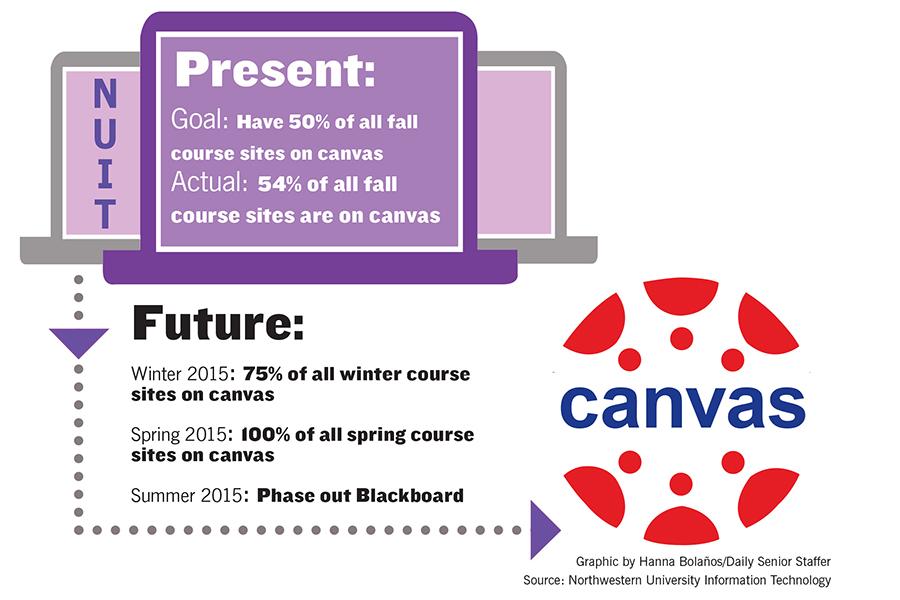Canvas transition ahead of schedule
September 29, 2014
More than half of Northwestern’s classes have transitioned to the new Canvas online course management system, according to NU Information Technology, putting NU slightly ahead of schedule for the department’s goal of moving all courses to Canvas by Spring Quarter.
Victoria Getis, manager of faculty support services for NUIT, said about 54 percent of all courses have made the transition from the old Blackboard system. NUIT’s original goal was to have 25-50 percent of courses on Canvas by this quarter.
“We’re moving quickly to move from Blackboard to Canvas,” Getis said. “You can’t get through all the classes that the University teaches without going through an entire academic year.”
To facilitate the move from Blackboard to Canvas, NUIT worked with each undergraduate and graduate school to form a Canvas Transition Committee to help ensure Canvas meets each school’s specific needs.
Susanna Calkins, an associate director at the Searle Center for Advancing Learning and Teaching and a member of the Canvas Transition Committee, explained that although it may be inconvenient for students to look for course information on both Canvas and Blackboard, the transition has required instructors to rethink their courses.
“It gives you a chance to think about, ‘What is my course? What am I doing in my course?’ and to reflect a little bit,” she said. “It’s so easy in Blackboard just to do the same assignments, but when you had to make the switch you had to rethink, ‘Well what is it I really want my students doing in this course, and how am I going to arrange it?’”
Timothy Dohrer, director of the Master of Science in Education program, called NUIT’s goals timeline, which aims to phase out Blackboard by next summer, “forgiving” to both professors and students.
“I just spoke to a colleague at a different university just this week who was given literally three months notice that they were changing from Blackboard to Canvas,” Dohrer said. “I feel like NUIT did a very good thing and a very nice thing in giving instructors a full year to learn the program.”
NUIT offered intensive tutorials that began earlier this month to help instructors learn the program. About 750 professors attended, Getis said.
Currently, tutorials are running each week on the Evanston and Chicago campuses. NUIT also partnered with Instructure, the company that manages Canvas, to provide 24-hour online support.
“I got very fast turnaround time on support,” Dohrer said. “The one or two times I had to go online to get support … I was able to go online and chat with someone from Canvas immediately, and they were able to give me the help I needed.”
Weinberg sophomore Dominique Mejia said she has been able to navigate Canvas, which she uses for three of her courses this quarter, through simple exploration.
“I picked it up really quickly,” she said. “I think it’s more about just experimenting and clicking on things and trying to see where it leads you. I had no trouble with that. I found everything I needed to find.”
Although Dohrer and Calkins said certain aspects of Canvas still need adjustments, such as the email function and anti-plagiarism software, constant updates and refinements have made the transition smoother. Dohrer said the connection between CAESAR and Canvas, although sometimes unreliable, is a major improvement.
Getis stressed the importance of the tutorials in easing the natural transition.
“It entails rethinking how you do certain things or learning a new mindset to do certain things,” she said. “I find Canvas very intuitive, but none of these systems are so intuitive that you don’t need a little bit of training, a little bit of understanding of how the system works if you’re going to really take advantage of all that it offers.”
Email: [email protected]
Twitter: @MarkFicken


